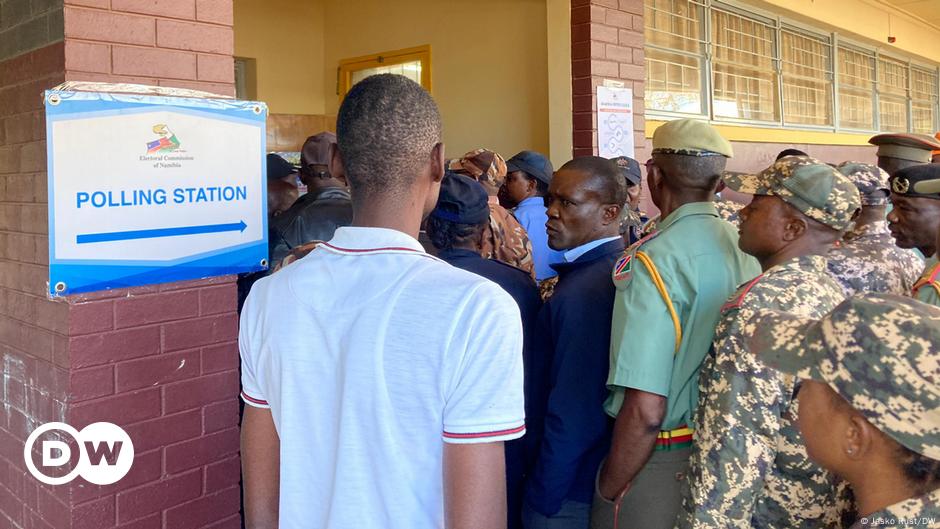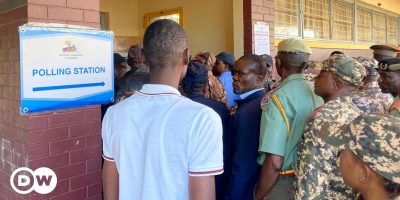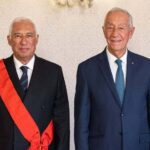Across southern Africa, support for long-standing ruling parties has dwindled during the past year.
South Africa’s once-strong African National Congress (ANC) had to form a coalition government with the Democratic Alliance (DA) to govern for the first time since independence. Neighboring Mozambique is facing violent unrest after Frelimo’s disputed election win. Opposition parties have recently won in Botswana and Mauritius.
Namibia is holding its elections on Wednesday, where the governing South West Africa People’s Organisation (SWAPO), which has been in power since 1990, remains strong in the country’s populous northern regions.
New start for Botswana after historic election
Could SWAPO recover from its 2019 decline?
SWAPO has already seen a decline, however. In Namibia’s 2019 parliamentary elections, it lost its two-thirds majority in the National Assembly for the first time since independence. The late President Hage Geingob, who passed away earlier this year, recorded the weakest election result in the party’s history with around 56%. In the 2020 local elections, SWAPO also lost control of urban centers, including the capital, Windhoek, and the key port city of Walvis Bay.
While SWAPO seems to follow the regional trend of liberation movements losing ground, Namibian political scientist Rakkel Andreas argued that “the change taking place in southern Africa cannot be generalized as an anti-liberation movement.” The political dynamics in each country are too distinct for such a broad categorization, she noted.
Lecturer Rui Tyitende addrf that SWAPO’s resilience is due to a weak, fragmented opposition.
SWAPO’s strength lies in opposition’s weakness
A total of 21 parties are competing in Wednesday’ parliamentary elections, along with 15 presidential candidates. According to Tyitende, the political space is suffering from overcrowding.
“The reason for the fragmentation is not related to political or ideological issues, but to egos, to personality clashes,” she told DW, adding that there is no unified opposition coalition against SWAPO.
Added to this is the proportional electoral system in Namibia, which allows even the smallest parties to win seats in parliament. German-Namibian political scientist Henning Melber explained that this attracts individuals “who only stand for political office because they hope to gain access to the honey pots.”
Material privileges have always been a motivating factor in Namibian politics, Melber added.
The opposition has also struggled to maintain voter confidence since their successes in the 2020 local and regional elections. In Windhoek, an opposition coalition failed, and SWAPO has regained power in a new coalition.
Melber added that “with this opposition, SWAPO has a better chance of emerging relatively unscathed.”
The woman to bring Namibia’s colonial past to the screen
First female president?
Political veteran Netumbo Nandi-Ndaitwah is aiming to become Namibia’s first female president. She is currently serving as the country’s vice president under interim head of state Nangolo Mbumba, who decided not to run for office after taking over in February.
At 72, Nandi-Ndaitwah pledged to create jobs and tackle the 20% unemployment rate among young people and graduates, with a promise to invest 85 billion Namibian dollars ($4.7 billion) over the next five years to generate over 500,000 jobs — a goal critics find unrealistic.
Women’s issues, such as reproductive rights, equal pay, and healthcare, are also expected to be significant for voters.
If elected, Nandi-Ndaitwah would follow in the footsteps of trailblazing female leaders like Liberia’s Ellen Johnson Sirleaf, Malawi’s Joyce Banda, and Catherine Samba-Panza of the Central African Republic.
Nandi-Ndaitwah has been a prominent figure in Namibian politics since independence, holding numerous ministerial positions. Analyst Rui Tyitende noted that she is perceived as “a president with no skeletons in the closet.”
Who can challenge SWAPO for the presidency?
The election remains undecided largely because of the IPC (Independent Patriots for Change). Its leader, Panduleni Itula, a former dentist and ex-SWAPO member, ran as an independent candidate in 2019, capturing 30% of the vote from his former party colleague Hage Geingob. He is now seen as the most promising opposition candidate.
However, Itula and his new party will face a united SWAPO and a strong government candidate in Nandi-Ndaitwah.
Although being a strong opposition candidate, Itula might face a public backlash related to his marriage to a British woman. According to political scientist Melber, the criticism of a possible foreign and white first lady shows the historical resentment that still exists from the colonial era.
Rakkel Andreas added that the scars still run deep: “The symbolism is simply problematic, I think it will be very difficult for many Namibians to accept it.” Namibia has been a colony under white minority rule since 1885, first with Germany as the colonial power and then as a mandate territory of South Africa.
Parliamentary elections: a glimmer of hope for the opposition
The competition for parliamentary seats is expected to be intense. Andreas, Melber, and Tyitende predict the IPC will emerge as Namibia’s offiical opposition, becoming the second-strongest party.
Additionally, the new left-wing party Affirmative Repositioning (AR), led by former SWAPO member Job Amupanda, is also pushing its way into parliament. This could force the ruling party into a coalition.
“Space will have to be created for the IPC and AR and I believe that this will be at the expense of SWAPO,” says Rakkel Andreas.
A final mood test before the elections seems to confirm this trend. Approximately 16,000 Namibians abroad, uniformed civil servants, and seafarers have already cast their votes. While official results are not yet available, preliminary figures indicate a clear trend: a SWAPO victory ahead of the IPC and AR.
This article was originally written in German. News agency AP contributred reporting.















